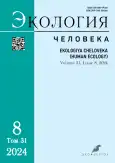Elemental status and social tension in selected regions of Russia
- Authors: Mulik A.B.1, Nazarov N.O.2, Ulesikova I.V.1, Kunavin M.A.3, Soloviev A.G.4, Shatyr Y.A.1
-
Affiliations:
- Kirov Military Medical Academy
- Change Implementation Center of the Ministry of Health of the Moscow Region
- Northern (Arctic) Federal University named after M.V. Lomonosov
- Northern State Medical University
- Issue: Vol 31, No 8 (2024)
- Pages: 586-597
- Section: ORIGINAL STUDY ARTICLES
- URL: https://journal-vniispk.ru/1728-0869/article/view/314538
- DOI: https://doi.org/10.17816/humeco643086
- EDN: https://elibrary.ru/WWJTUK
- ID: 314538
Cite item
Full Text
Abstract
BACKGROUND: The elemental status of a population in a specific geographic area is shaped by the concentration of various macro- and microelements in soil, air, water, and food. Existing Russian and international studies suggest that biologically significant elements in the environment may influence psycho-emotional states and contribute to the risk of deviant behavior. However, there is no available information on the systemic relationships between the elemental status of regional populations and the severity of social and criminal tension indicators in society.
AIM: This exploratory study investigates the role of biologically significant macro- and microelements in shaping social and criminal tension among the populations of specific regions in the Russian Federation.
MATERIALS AND METHODS: Theoretical research was based on the analysis of data from the Federal State Statistics Service and cartographic materials from the National Atlas of Russia. The field stage of the study was conducted in 14 model regions and involved 700 representatives of the local population of the studied territories. Elemental status was assessed through hair sample analysis for biologically significant elements (Al, As, B, Be, Ca, Cd, Co, Cr, Cu, Fe, Hg, I, K, Li, Mg, Mn, Na, Ni, P, Pb, Se, Si, Sn, V, Zn). At the third (analytical) stage of the study, statistical analysis was conducted to assess the relationships between social and criminal tension indicators and the elemental status of residents in the model regions. Additionally, a comparative analysis was performed to evaluate the concentrations of biologically significant chemical elements in individuals from regions characterized by the lowest and highest levels of deviant behavior. The obtained results were processed using statistical methods, including Spearman’s correlation coefficient, the Wilcoxon–Mann–Whitney test, and the calculation of the median (Me) and quartiles (Q1; Q3).
RESULTS: A range of deviant social behaviors was systematically observed in the model regions, including homicide, suicide, alcohol abuse, smoking, and induced abortion. Statistically significant associations were found between these deviant behaviors and the concentrations of specific biologically significant elements in the human body. A comparative analysis of elemental status was conducted for local population of regions with the highest and lowest levels of deviant behavior. Refined critical thresholds of chemical element concentrations were identified for local populations in various regions of the Russian Federation, corresponding to different levels of social and criminal tension.
CONCLUSION: The findings specify the potentially significant biogeochemical factors influencing the risks of forming key vectors of social and criminal tension in population groups unified by their geographic location within the Russian Federation.
Full Text
##article.viewOnOriginalSite##About the authors
Alexander B. Mulik
Kirov Military Medical Academy
Author for correspondence.
Email: mulikab@mail.ru
ORCID iD: 0000-0001-6472-839X
SPIN-code: 8079-9698
Dr. Sci. (Biology), Professor
Russian Federation, Saint PetersburgNikita O. Nazarov
Change Implementation Center of the Ministry of Health of the Moscow Region
Email: naznik86@gmail.com
ORCID iD: 0000-0002-0668-4664
SPIN-code: 9126-2809
MD, Cand. Sci. (Medicine)
Russian Federation, KrasnogrskIrina V. Ulesikova
Kirov Military Medical Academy
Email: ulesikovairina@mail.ru
ORCID iD: 0000-0001-9284-3280
SPIN-code: 9859-6036
Cand. Sci. (Biology)
Russian Federation, Saint PetersburgMikhail A. Kunavin
Northern (Arctic) Federal University named after M.V. Lomonosov
Email: m.kunavin@narfu.ru
ORCID iD: 0000-0001-7948-1043
SPIN-code: 5271-0260
Cand. Sci. (Biology), Associate Professor
Russian Federation, ArkhangelskAndrey G. Soloviev
Northern State Medical University
Email: asoloviev1@yandex.ru
ORCID iD: 0000-0002-0350-1359
SPIN-code: 2952-0619
MD, Dr. Sci. (Medicine), Professor
Russian Federation, ArkhangelskYulia A. Shatyr
Kirov Military Medical Academy
Email: yuliashatyr@gmail.com
ORCID iD: 0000-0001-9279-5282
SPIN-code: 2942-6250
Cand. Sci. (Biology), Associate Professor
Russian Federation, Saint PetersburgReferences
- Vinogradov AP. Chemical elemental composition of organisms and the Periodic table of D.N. Mendeleyev. Proceedings of the Biochemical Laboratory of the USSR Academy of Sciences. 1935;3:3–30. (In Russ.)
- Koval'skii VV. Geochemical ecology. Moscow: Nauka; 1974. 299 р. (In Russ.)
- Aftanas LI, Berezkina ES, Bonitenko EYu, et al. Elemental status of the population of Russia. St. Petersburg: Medkniga ELBI-SPb; 2014. 544 p. (In Russ.) EDN: VINXKJ
- Cheremushkina II. Trace elements and aggressive tendencies in behavior. Trace Elements in Medicine. 2012;13(4):24–31. EDN: PLXXCF
- Ekinci GN, Sanlier N. The relationship between nutrition and depression in the life process: a mini-review. Exp Gerontol. 2023;172:112072. doi: 10.1016/j.exger.2022.112072
- Bekker RA, Bykov YuV, Shkurat AO, Voronina AS. Magnesium preparations in psychiatry, addiction medicine, neurology and general medicine (part I. History). Acta Biomedica Scientifica. 2019;4(3):63–80. doi: 10.29413/ABS.2019-4.3 EDN: PVDIVD
- Janka Z. Tracing trace elements in mental functions. Ideggyogy Sz. 2019;72(11-12):367–379. doi: 10.18071/isz.72.0367
- Giotakos O. Is impulsivity in part a lithium deficiency state? Psychiatriki. 2018;29(3):264–270. doi: 10.22365/jpsych.2018.293.264
- Mulik AB, Nazarov NO, Ulesikova IV, et al. Elemental status and psychological predisposition of the Russian population to deviant behavior. Ekologiya cheloveka (Human Ecology). 2023;30(6):457–467. doi: 10.17816/humeco409629 EDN: JBIHHI
- The National Atlas of Russia. Nature and Ecology. Maps of FSUE Gosgiscenter [CD-ROM]. Moscow: Roskartografiya; 2007.
- Kholmatova KK, Grjibovski AM. Ecological studies in medicine and public health. Ekologiya cheloveka (Human Ecology). 2016;23(9):57–64. doi: 10.33396/1728-0869-2016-9-57-64 EDN: WKFTPN
Supplementary files













